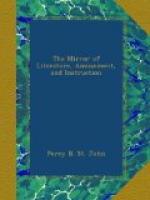to one or two solitary jets d’eau in almost unfrequented
places. It should be added, that in Southwark, an extensive and
commodious market-place is just completed, and the tolls are
proportionally increasing. A similar improvement is much wanted in
Covent Garden, by which means many of the evils of that spot would
be abated, and instead of seeing Nature’s choicest productions
huddled together, and being ourselves tortured in the scramble and
confusion of a crowd, we might then range through the avenues of
Covent Garden with all the comfort which our forefathers were wont
to enjoy on this spot, or certainly with comparative ease.—ED.
* * * * *
THE SELECTOR;
AND
LITERARY NOTICES OF
NEW WORKS.
RISE AND FALL OF NAPOLEON.
With his passions, and in spite of his errors, Napoleon is, taking him all in all, the greatest warrior of modern times. He carried into battle a stoical courage, a profoundly calculated tenacity, a mind fertile in sudden inspirations, which by unhopedfor resources disconcerted the plans of the enemy. Let us beware of attributing a long series of success to the organic power of the masses which he set in motion. The most experienced eye could scarcely discover in them any thing but elements of disorder. Still less let it be said that he was a successful captain because he was a mighty monarch. Of all his campaigns, the most memorable are,—the campaign of the Adige, where the general of yesterday, commanding an army by no means numerous, and at first badly appointed, placed himself at once above Turenne and on a level with Frederick; and the campaign in France in 1814, when, reduced to a handful of harassed troops, he combated a force of ten times their number. The last flashes of imperial lightning still dazzled the eyes of our enemies; and it was a fine sight to see the bounds of the old lion tracked, hunted down, beset, presenting a lively picture of the days of his youth, when his powers developed themselves in the fields of carnage.
Napoleon possessed, in an eminent degree, the faculties requisite for the profession of arms; temperate and robust, watching and sleeping at pleasure, appearing unawares where he was least expected, he did not disregard details to which important results are sometimes attached. The hand which had just traced rules for the government of many millions of men would frequently rectify an incorrect statement of the situation of a regiment, or write down whence two hundred conscripts were to be obtained, and from what magazine their shoes were to be taken. A patient and easy interlocutor, he was a home questioner, and he could listen—a rare talent in the grandees of the earth. He carried with him into battle a cool and impassable courage; never was mind so deeply meditative, more fertile in rapid and sudden illuminations. On becoming emperor he ceased not to be the soldier. If his activity decreased with the progress of age, that was owing to the decrease of his physical powers.




